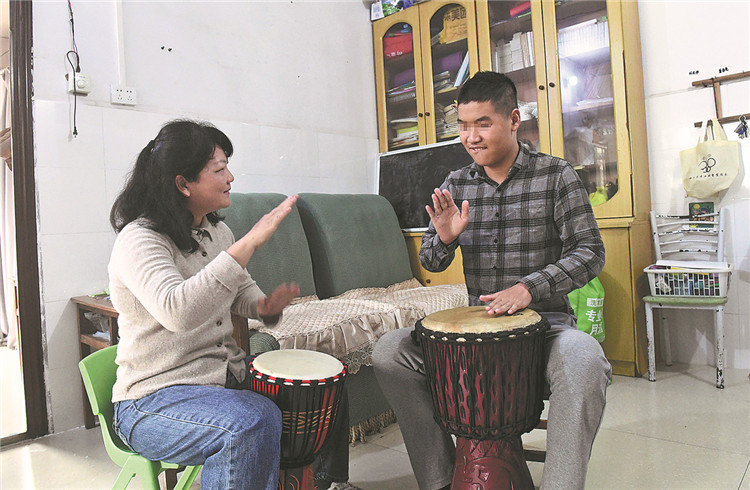Education
Lifelong support for autism

A mother teaches her son who suffers from autism to play drum in Nanning city, Guangxi Zhuang autonomous region on March 31. LU BOAN/XINHUA
When the mother receives support from the group and society, her autistic child feels it too. "Everything is better," she said.
Data from the China Association for the Mentally Disabled and Their Relatives and Friends showed that China has about 14 million people with autism. Millions of families are struggling with the disease.
Care, however, is still insufficient.
According to the Blue Book on the Needs of Autistic Families in China released by the association, 95 percent of parents believe that professional counseling and policy information are urgently needed, and 79.1 percent said they have not received systematic, specialized training in rehabilitation education or other skills important in caring for autistic children.
The same document revealed that most families with autistic children are under economic pressure, and more than half have one person give up work to take care of children. Multiple stresses affect family stability. Parents are also marginalized by society.
A survey jointly conducted by the Shenzhen International Public Welfare Institute and Tencent Public Welfare Center showed that autistic people of different ages have various core needs. Family, school and society constitute the social support network of autistic people, with family at the core.
"Family is the smallest unit of social connection through which people receive support, and family members are lifelong companions and caregivers for people with autism," said Guo Xiamei, associate professor in psychology at Xiamen University in Fujian province. "That is why a community-based support system for families with autistic members is encouraged and valued."
To support autistic children with social education encourages them to get in touch with society, said Zhen Yuelai, a lecturer from the Beijing Information Science and Technology University, also an expert on social education for sufferers of autism.
"The social development of autistic people cannot be limited to rehabilitation or 'treatment' in the classroom or hospital," said Wen Hong, president of the China Association for the Mentally Disabled and Their Relatives and Friends.
"In particular, training to adapt to daily life and different social settings is needed, and community-based provision of necessary supportive services is required," she added.
"It is important to build a community to provide independent living and community acceptance for children as they are growing up, and also to provide support for adult autism sufferers after their parents have passed away," said Feng Tao from the association.
Zhen echoed this concern: "When the parents of autistic people get older, who should they entrust their children to at the end of their lives?"
Autistic children receive much attention from society. But when those children become adults, less social assistance is provided. Families of people with autism again must shoulder the full burden of caring for them.

Copyright 1995 - . All rights reserved. The content (including but not limited to text, photo, multimedia information, etc) published in this site belongs to China Daily Information Co (CDIC). Without written authorization from CDIC, such content shall not be republished or used in any form. Note: Browsers with 1024*768 or higher resolution are suggested for this site.
Registration Number: 130349









